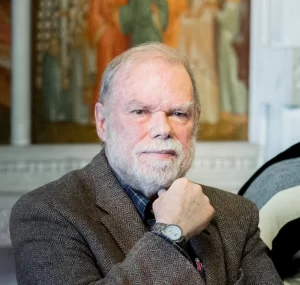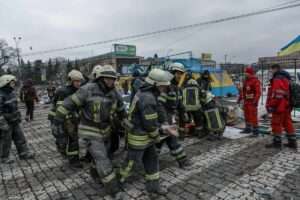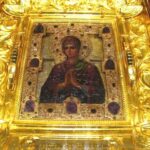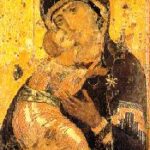Who Is My Neighbor?
by Sister Magdalen
Sister Magdalen is a nun of the Community of Saint John the Baptist in Essex, England. This is based on notes from a talk she gave at the Syndesmos-Netherlands conference near the Monastery of the Nativity of the Mother of Godnear the village of Asten.
The question was put to Christ, "Who is my neighbor?"(Luke 10:29) Notice that this is not an abstract but a concrete question that concerns each one of us personally -- it is not who is our neighbor. The question is answered by the Lord in the parable of the good Samaritan, at the end of which Christ turns the question in a seemingly illogical way: He shows the young man who asked the question how he can be a neighbor. The neighbor is the one who shows mercy. Then Christ says, "Go and do you likewise." The question becomes, "How can I be a good neighbor?" By my becoming a good neighbor to others, everyone becomes a neighbor to me. We are asked not to find a neighbor but to become a neighbor.
This is not only a moral question, a question of behavior, a question of earthly help. It is properly speaking a theological question.
As Saint John insists, "Whoever does not love a neighbor whom he has seen cannot love God whom he has not seen" (1 John 4:20). The criterion for our faith in God is participation in God's love. Christ prays that the love of the Father and the Holy Spirit "may be in us." God in Himself loves person to person to person, to such perfection that the Three Persons in God are one being.
Love is the criterion of discipleship. "By this shall all know that you are my disciples, that you have love one for another." (John 13:35)
We are given two commandments -- to love God with our whole being and to love ourneighbor as yourself. Christ says the second commandment "is like the first." To love like this is, He says, "a new commandment" (John 13:34). It is new because it is a progress from Old Testament love, which had to forge tribal unity. In the Old Testament enemies were massacred with the blessing of God. But we must understand the pedagogy of God: there was a need to have a united people to prepare the way for the Messiah to be born. But Christ came and taught universal love of all my fellow men, even my enemies. In fact these two are connected -- because through love enemies are recognized as neighbors.
Some love, we can say, comes by nature -- the love of a mother for her children.
Christ commanded love which does not, in our fallen state, come "naturally."
The phrase "to love your neighbor as yourself" is sometimes misinterpreted to mean, "first I must love myself, that is I must have self-esteem, only then I can love my neighbor." The Christian way is to deny ourselves, to die to ourselves, so that can love our neighbor. My neighbor's life is mine -- or as Saint Silouan of the Holy Mountain says, "My brother is my life."
The Divine Person of Christ, as man, lived all our suffering. He said that the greatest act of friendship or love is to give up your life for another. Such love can only come from God. It is a gift of the Holy Spirit. Indeed the prime gift of the Holy Spirit is love. All other gifts are manifestations of love.
How do we begin? Saint Dorotheus of Gaza says, "You cannot climb a ladder in one step." There is the proverb, "Charity begins at home." We begin with those whom the providence of God has put in our path. While our faith has cosmic significance, Christian life is lived in the details of everyday life. The way of love we see in Saint Silouan is far ahead of us, but we can begin by taking small steps. For example, when offended, the first step is to avoid revenge, even by self-restraint despite our still feeling inner resentment; and from there we go on to learn to feel compassion and love.
The great test is the love of enemies. Love is not just a nice feeling when I am with certain people whom I find it easy to be with. It is very hard to love those who are unjust to us, or are unjust to those whom we care about, or are unjust to the Church. Yet, as Saint Silouan said,"the criterion of the true Christian is love of enemies." This is at the heart of the Gospel.
Reflecting on the parable of the good Samaritan, we recognize that one valid interpretation sees Christ Himself as the Samaritan, who pours on us, sick and wounded humanity, the oil and wine of the healing sacraments. The inn He brings us to is the Church. The "money" He leaves is the gift of the Holy Spirit. In other words, the parable concerns other levels as well as that of exterior service. One of the most loving things we can do for our neighbor is to pray for our neighbor. Behind all exterior ways of serving our neighbor there should be prayer. Prayer is our greatest service. One hears occasionally that prayer is a cop-out. "Prayer for our fellow man is truly a shedding of our blood," Saint Silouan said. Prayer is not the easy way out. It is a work for everyone to do.
In Matthew 25 we see Christ identifying Himself with each of our neighbors. Here Christ calls on his followers to feed the hungry, give drink to the thirsty, clothe the naked, give hospitality to the homeless, care for the sick and visit the prisoner. We must not neglect these forms of visible help, each person according to his possibilities. But Saint Simeon the New Theologian tells us we can also do these things in prayer -- we can bring care for the sick by prayer and be present to prisoners in prayer.
Learning to love those who are difficult to love, we must first pray for them.
We can also express love when we do not yet feel it. A man confessed he had no love for God or for man, but he decided to act as if he loved. Then after 35 years he was given the grace to love. His actions during those 35 years were not hypocrisy. It was training. When we have taken Holy Communion, we pray for the grace to love: "May this Holy Communion be for me unto sincere love..." We ask "to live not for myself but for Thee," a prayer which describes love.
Similarly we can pray for those who we feel we cannot love. "Lord Jesus Christ, have mercy on thy servant (name) and by his/her prayers have mercy on me."
God is divine, we are human. God, although divine, can live in me to such an extent that His love can act in me, can transform my human love with His divine love. Love is the path to eternity.
From the responses of Sister Magdalen to questions:
Learning to love is painful. It is like the pain that comes from learning to use a limb after an injury. The paralyzed person comes to think of his condition as normal. The pain that one must pass through in overcoming paralysis feels like death.
Sometimes saints, because they are willing to suffer the pain of love, are described as masochists. But self-giving love is not a psychological illness, no more than the mother who responds to her child's needs is ill because she lives for another.
In fact there is a great joy in love, and also sadness. Saint Paul says to rejoice with those who rejoice and weep with those who weep.
We must avoid the temptation to make the Gospel fit either our "need" or a worldly view of our current "possibility" in a given situation. In our personal life we must stop repaying evil with evil even if it means in the initial stages chaining ourselves to a chair in order to control our rage.
Saint Paul says, "Love thinketh no evil" (1 Cor 13:4). Also we hear the words of Christ on the Cross, "They don't know what they are doing" (Luke 23:34). He is, as it were, making excuses for His enemies. We must ask Him to give us that love.
Whenever we are confronted with irritations, we should regard them as tests. Regard the actions of others, even evil actions, as the providence of God, what He has allowed to happen to me -- only my own evil actions are not to be considered God's providence, I take the blame for them.
Remember the different responses of Christ. Sometimes He was silent. Sometimes He ran away. Sometimes He spoke with anger. But He never feared and He always loved the other.
[notes taken by Jim Forest and corrected by Sister Magdalen]








